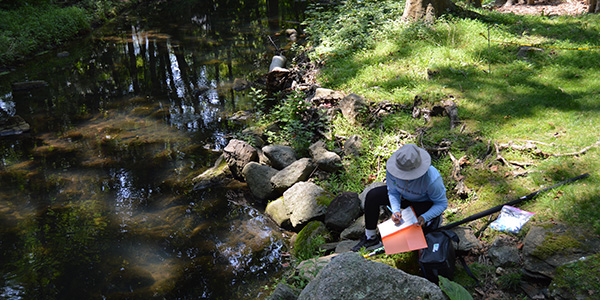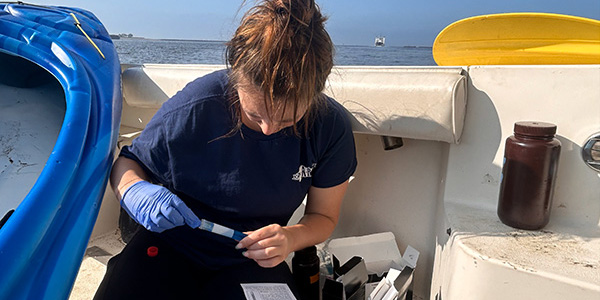
From the second week of June through Labor Day Weekend, they are out there. A collection force of 20-something Save the Sound full-time and seasonal staff, and community scientists, hiking through woods and wetlands, withstanding the drizzles and deluges, mosquitoes and mugginess, maybe wading out into a creek or balancing on loose rocks on the shoreline, all to get into position to fill a 100-milliliter bottle with water and bring it back to our lab.
Glamorous work it is not. But then what would you expect when you’re collecting samples for our pathogen indicator bacteria monitoring program, which actually is the more appealing way of describing this important work. Since 2013, Save the Sound has been sampling waterbodies in western Long Island Sound for fecal bacteria.
Samples are collected weekly from more than 60 locations in Greenwich, CT, Westchester County, NY, and Queens. They are brought back to the John and Daria Barry Foundation Water Quality Lab in our Larchmont office, where our team processes them, places them in incubators, and analyzes them the next day under a UV black light to determine the presence of bacteria. We’re looking for E. coli in freshwater and Enterococcus in saline water (which is the same bacteria the EPA recommendations for testing water quality at swimming beaches to determine whether or not waters are safe for human contact).
Every week, we publish the results, which show which locations met the established single-sample criteria for safe swimming, which ones failed to meet the criteria, and which failed by 10 times or greater. The published data also shows whether a sample was collected in what we consider wet conditions (when a half-inch of rainfall or more has fallen in the 72 hours prior to sampling).
“Ultimately, we hope to help identify where there are problems with infrastructure, such as sewer overflows, catch basins, culverts, septic systems. Those tend to be the sources of the problems we’re having with elevated levels of bacteria entering our waterways,” said Environmental Analyst Ameera Khan, who manages our bacteria monitoring program and trains the corps of community volunteers who help conduct the sampling.
Last week, we launched another water quality sampling effort — this one focused on ecological health — when Associate Soundkeeper Emma DeLoughry and two Soundkeeper interns collected water samples from stormwater pipes in Bridgeport Harbor. It was the first outing as part of a new EPA Stormwater Equipment Loan Program.
This program provides us with the equipment to conduct stormwater testing the way municipalities do in accordance with their MS4 stormwater management plan, allowing us to measure ammonia, chlorine, and surfactant levels, as well as salinity, conductivity, and temperature.

“We are hoping this gives us a more holistic picture over time of where pollutants can be entering our waterbodies,” said Emma, who will continue sampling with this program many times over the course of the summer.
If you are interested in helping with our ongoing 2023 seasonal bacteria monitoring program, please send an email to akhan@savethesound.org. Specifically, we are looking for people to sample locations in Rye, Port Chester, and Greenwich on Mondays and/or in Larchmont and Mamaroneck on Wednesdays. Both days would require availability from 10:00 a.m. until 1:00 p.m. Interested candidates do not need previous experience but should have their own transportation in order to cover multiple sites and deliver the samples to the lab.
